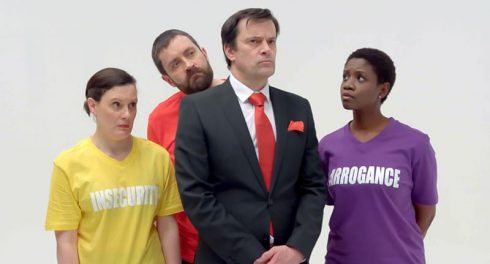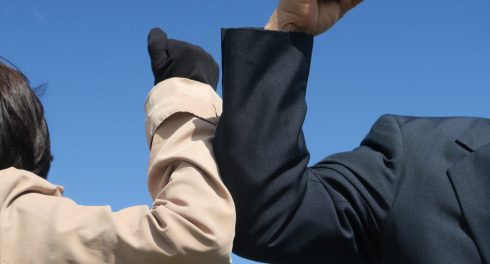Highlights
- Bring in the people
- Build back open
- Show me the money
- The dark side
- Just do it don’t
- Where do I rank?
- The art of tax paying
- At the Frontier
- TAI Spotlight: Collaboration Case Note: Collective funder voice
Bring in the people

Image Credit: The Communication Initiative
In the French city of Orléans, citizens, experts, and politicians are attempting to build a new type of “social contract” around climate action through innovative forms of public engagement. Ian Babelon, Nadja Nickel, and Paola Pierri suggest the new model suggests a way to bridge the “often-observed gap between participation and representative democracy.”
Hopefully, that extends to those typically excluded from decision-making, as new analysis of Twitter conversations reveals the urgent need to place the experiences of marginalized communities and issues of justice at the heart of the climate agenda. For Esther Ngumbi, that should entail listening to youth, ensuring they have access to information, and appointing them as climate change envoys.
Students have long raised the alarm about investing in fossil fuels, and Ilana Cohen finds that divestment remains the single most powerful litmus test for climate action. Bastian Buck and Marco van der Ree argue for a more nuanced approach, suggesting that increased transparency – exemplified through more impactful sustainability reporting- offers a pathway to more sustainable earth,
CSOs in SADC countries argue that the devastating socio-economic effects of the COVID-19 pandemic make it even more urgent to maximize tax revenue from the extractives sector. Meanwhile, the Extractive Industries Transparency Initiative board chair expresses concern on recent instability in Chad, urging stakeholders to exercise restraint and ensure that civic freedoms are respected.
Of course, once an ore is dug up or oil pumped out, it will not replenish itself. The bad news is that other resources we rely on may be heading the same way. Sue Ryu looks at the direction of illegal, unregulated, and unreported fishing, resulting in unsustainable extraction of fish.
Environmentalists for fossil fuel projects have long opposed the concept of eminent domain, but Ysabelle Kempe explores how this legal power could be vital to building renewable energy infrastructure. Staying with infrastructure – how to boost transparency, participation, and accountability in big project delivery? The Construction Infrastructure Transparency Initiative offers some answers with their final guidance on ways to improve data disclosure, multi-stakeholder working, and social accountability in the sector.
Build back open
Protection of the planet is also on the minds of over 200 civil society organizations globally have published their demands for world leaders, notably the G7, to use the COVID-19 pandemic recovery to pursue systemic change. Other demands include a sustainable post-pandemic economic recovery, equitable access to COVID-19 vaccines, racial justice, and promotion of open societies.
The G7 meeting next month is far from the only pending international gathering. Abigail Bellows list events civil society champions and open government reformers can use to build global momentum around building back better and renewing democracies while turning conversations into concrete commitments through their OGP action plans.
What key demands have been left out of open government action plans? Open Government Partnership would like to hear from civil society representatives in Latin America that have ever been a part of the OGP process. Take this survey to help OGP advance open government action plans for a more just and open society in the region.
Want inspiration for open contracting commitments specifically? Check out how Guatemalan online platform Plaza Pública exercised constant scrutiny over emergency procurement in the country.
Show me the money

Amid an economic crisis, losses due to graft and corruption rub more raw than usual. Will it create pressure to clean up our acts? Problems go deep. Appearing in his capacity as ANC chair, South African President Ramaphosa admits to ANC mistakes in allowing looting “under our watch” in testimony to the judicial inquiry into state capture. Tom Burgis worries that “Global Britain” might simply prove synonymous with being a hub for dirty money (even more than it is already).
In further evidence of the need for audit reform, it turns out that one obscure, tiny audit firm signed off on the billions claimed on the books of Sanjeev Gupta’s empire of 60 British companies. For reminders on the case for reform, don’t forget Andrew Clarke’s post last month and Marcos Mendiburu’s piece on the future agenda for citizen participation in auditing.
Fourteen years after its first ‘ill-gotten gains’ case, France’s National Assembly has finally addressed the issue of restitution of ill-gotten gains –presenting an opportunity for the country to be a global leader in combating transnational corruption, especially in case of restitution of illicit assets to affected populations. Meanwhile, Airbus pleads guilty in a corruption case involving U.K. services to the Saudi military and ordered to pay over $42m.
The dark side
A new essay collection from experts across the field delves into the intersection between COVID-19 and transnational kleptocracy and how civil society and independent media can respond to new challenges posed by the pandemic. Pair with the final additions to the NED’s Sharp Power & Democratic Resilience series. The latest additions examine how China has been “leveraging propaganda, disinformation, censorship, and influence over key nodes in the information flow and how emerging technologies contributing to everyday problem-solving can simultaneously expand authoritarian power.
Further signs of repression in Russia where opposition leader Navalny’s network is forced underground, and his Anti-Corruption Foundation restricted, while more independent media outlets are labeled foreign agents.
Thai authorities are proposing a new NGO law that would grant the government power to restrict foreign funding and NGO activities in the name of transparency, but like many other proposed the world over, activists say these NGO laws are hostile to civil society and meant to punish dissent. How to survive? Research in Kenya shows that the protection strategies of victims, survivors, and activists are embedded in everyday relationships – community response and shows of solidarity are vital.
In a very different U.S. context, Roger Colinvaux fears that a donor privacy case before the Supreme Court could be a path to limit nonprofit transparency – opening the door for more secret money and casting doubt, “on key federal laws that ensure the transparency of all the nation’s nonprofits.”
Just do it don’t

Image Credit: MIT/GOV LAB
Should you build civic tech? Probably not, counsels Luke Jordan. “If you can avoiding building it, don’t; if you have to build it, hire a chief technology officer (CTO), ship early, and mature long; and if you can’t do that (or even if you can), draw on a trusted crew, build lean and fast, and get close to and build with your users as fast as possible.”
For more, see the full practical guide on how and when to put together a team to build a civic technology (i.e., technology that helps people engage government more effectively). Its spirit is very much in line with our guidance for accountability groups from last year So, you think you need a data person?. Answer – you usually don’t.
Want something you should do? Check out Development Gateway’s guide on how you can effectively use data to tell stories.
What about less tech-heavy approaches? See Integrity Action’s upcoming research on how to help service providers respond to their communities’ needs and what they are doing to advance gender and social justice.
Where do I rank?
Marco Bisogno shows how higher levels of budget transparency positively affect the quality of governance and vice versa. Perhaps President Duterte has been reading up. The leader of the Philippines has been discussing the state of budget transparency in the country, citing their performance on IBP’s Open Budget Survey as the most fiscally transparent country in Southeast Asia.
We don’t yet know how Duterte reacted to the Philippines’ 59th ranking in the newly released Chandler Good Government Index. How are different countries reacting to their scores? See examples from India, Singapore, Nigeria, and South Africa.
Staying in South Africa, Asivikelane’s latest report reveals that the latest metro area budgets still fail to include funds for basic sanitation maintenance, although vigilance and persistence from communities in demanding fixes show signs of paying off.
The art of tax paying

What do you do when facing an $11 billion tax bill? Donate a Picasso, a Monet, a Dali, or two… At least that’s the approach of the Samsung-founding family – they’ll pay in installments over five years. “It is our civic duty and responsibility to pay all taxes,” the Lee family said.
Meanwhile, as the U.S. Biden Administration calls for a more effective corporate tax system, the FACT Coalition make their case for equalizing rates through the No Tax Breaks for Outsourcing Act. Ian Gary and David Waskow explain the importance of fair tax systems to finance climate action.
At the frontier
Regardless of whether you plan to attend next week’s Frontiers of Social Innovation conference, you may want to dip into Stanford Social Innovation Review’s curated reading list of articles related to each session, including decolonization, alleviating poverty, new approaches to global development, and citizen-led innovation.
Following the launch of their Think Piece series last year, itad has published its first Practice Paper featuring series of publications where they put learning into practice. This revised booklet also profiles multiple, unique, and sometimes surprising paths to achieving impact.
For all interested in monitoring and evaluation (which should be all of us 😊), the Equitable Evaluation Initiative (EEI) and Grantmakers for Effective Organizations have also launched a report that reflects on ways to advance an equitable evaluation framework in philanthropy and evaluation practices.
Staying on philanthropic practice, Trent Stamp and Cathy Choi of The Eisner Foundation recommendation for foundations to break out of funding silos and embrace a more holistic approach that focuses on intergenerational solutions.
We end as we began with the climate agenda. It seems that every week there is a new private funder commitment to work on climate – this time, it is the Cisco Foundation revealing a ten-year, $100 million commitment to support efforts that address the impacts of climate change. No doubt, the scale of the challenge merits the investment. How much of the influx of funds will go to governance dimensions alongside technical solutions? TAI is starting scoping with climate funders to find out – stay tuned for more later in the summer.
TPA Full Disclosure: Jorge Florez on listening and sharing capacity to provide useful solutions to local problems

How do we bring people’s voices –especially those in the grassroots – into the work we do around transparency, accountability, and civic participation? Hear from Jorge Florez, the Senior program Manager and activist at Global Integrity, as we discuss existing gaps around using data to create local solutions and advancing open fiscal governance at the local level.
TAI SPOTLIGHT: Collaboration Case Note: Collective funder voice
Collaboration Case Note: Collective funder voice | Transparency and Accountability Initiative (TAI)
In early 2020, we formed a Collective Voice Working Group (CVWG) to explore whether and how our members could use the TAI platform to enhance impact on transparency, participation, and accountability issues by speaking with one, shared voice. Find out how the collaboration evolved, what we achieved, and learnt.
Is doing good good enough? | MacArthur Foundation
MacArthur Foundation President, John Palfrey, joins Rotary discussion series on how we can drive meaningful change and ways to deploy resources to realize a shared vision of a better world.
Towards a new era of public interest journalism| Luminate
Three months into her role as founding Executive Director of Luminate-backed International Fund for Public Interest Media, Sheetal Vyas reflects on the journey so far and calls for a multilateral fund to help countries forge a shared global agenda on media support.
The future of philanthropy: Transformational impact| Chandler Foundation
Listen to Chandler Foundation CEO, Tim Hanstad, moderate “The Future of Philanthropy: Transformational Impact,” a Skoll World Forum event featuring panelists from Surdna Foundation, North Star Fund, Asia Venture Philanthropy Network, and African Philanthropy Forum.
Vote for Disability Demands Justice | Ford Foundation
Ford Foundation’s #DisabilityDemandsJustice video series has been nominated for The Webby Awards in Public Service & Activism. If you believe there is no justice without disability, cast your virtual ballot here by May 6.
Job Listings
- Job postings at Hewlett Foundation – Ongoing
- Job postings at MacArthur Foundation – Ongoing
- Job postings at Open Society Foundations – Ongoing
- Job postings at Luminate – Ongoing
Job postings at Ford Foundation – Ongoing - Job postings at FCDO – Ongoing
Calls/Opportunities
- Paris Peace Forum: Call for projects – May 9, 2021
- Call for papers: National Tax Association conference – May 31, 2021
- West Africa Civil Society Institute (WACSI) call for papers and articles – Open year-round
- USAID’s Development Innovation Ventures (DIV) grant funding – Ongoing
- Call for research proposals Tax and civil society – No Deadline
- Free Digital Security Training – Ongoing
- Call for proposals: Informality, tax, and the state – Proposals accepted on a rolling basis
Calendar
- Effective storytelling for community engagement – May 6, 2021 (1:00pm – 2:30pm EDT)
- Weaving systemic alternatives from the Global South: A conversation with the Global Tapestry of Alternatives – May 11, 2021 (14:00 UTC)
- Frontiers of Social Innovation – May 11-13, 2021
- Virtual convening of Frontiers of Social Innovation: “People, Power, Resources: Enacting an Equitable Future” – May 11-13, 2021
- Frontiers 2021 Session: What data makes possible: access, inclusion and participation –May 12, 2021 (12:30 pm – 1:15 pm)
- Purpose-driven board leadership: Reconceiving foundation governance – May 13, 2021 (2:00 pm – 3:15 pm EDT)
- Open Gov week (Virtual) – May 17-21, 2021
- Empowering communities using geospatial technology – May 25, 2021 (10:00 EST)
- ITAD at UKES 2021: Evaluation and evaluative thinking –May 25-27, 2021
- Lie machines: How disinformation threatens democracy and how to save it –June 10, 2020 (11:00 am – 12:00 pm)
- Global Investigative Journalism conference – November 3-5, 2021
- National Tax Association conference – November 18-20, 2021


